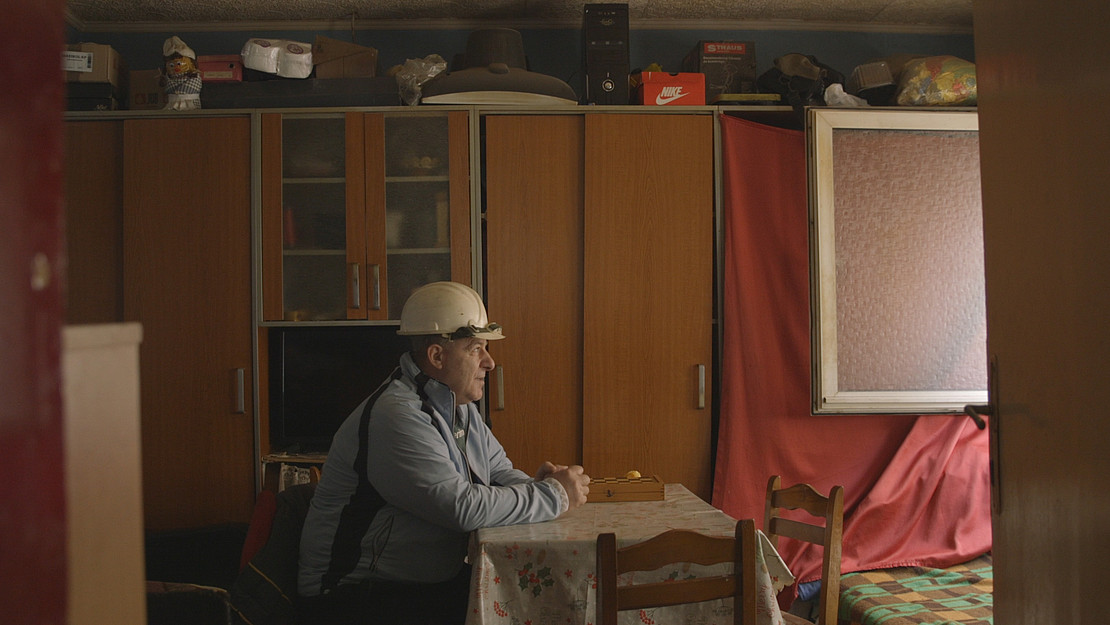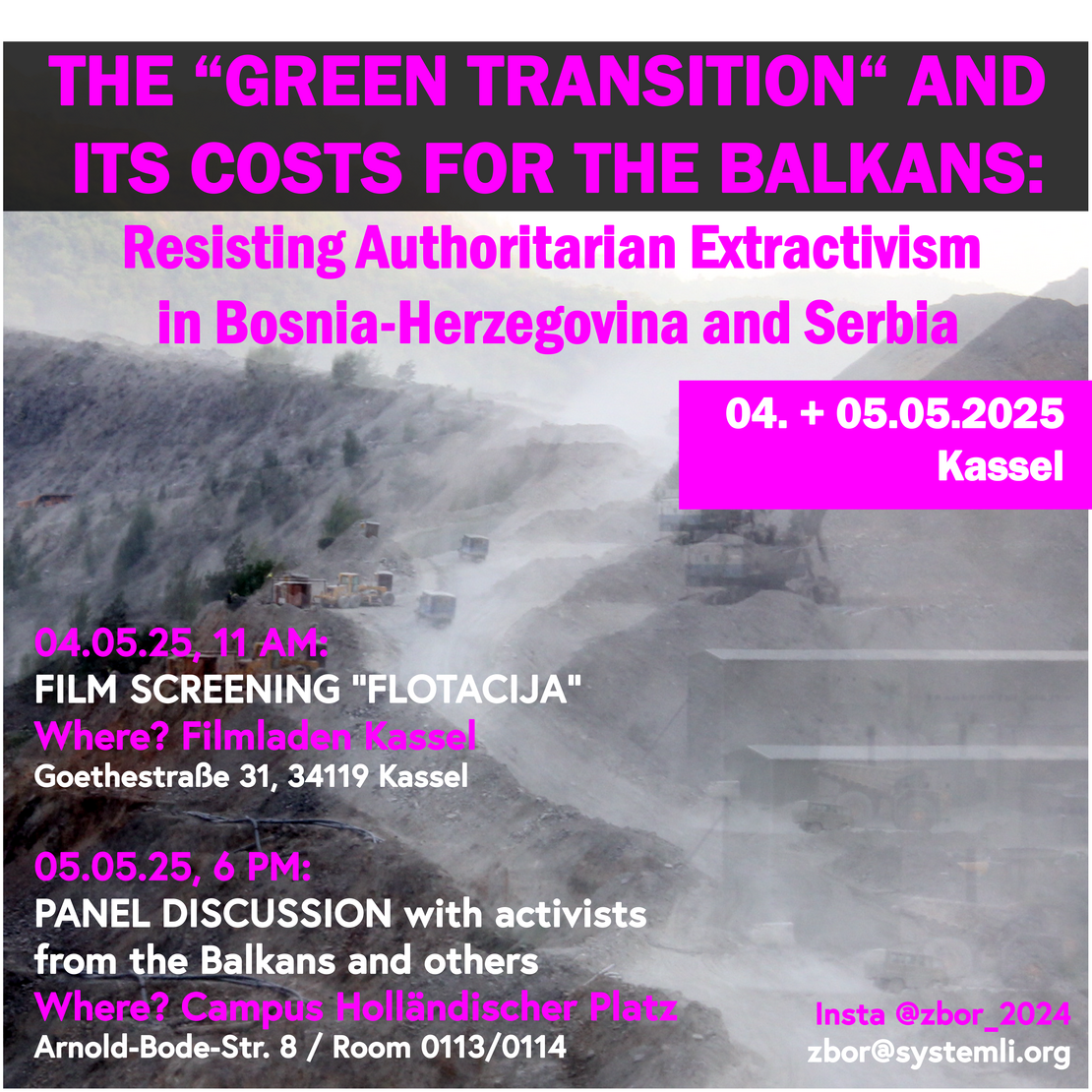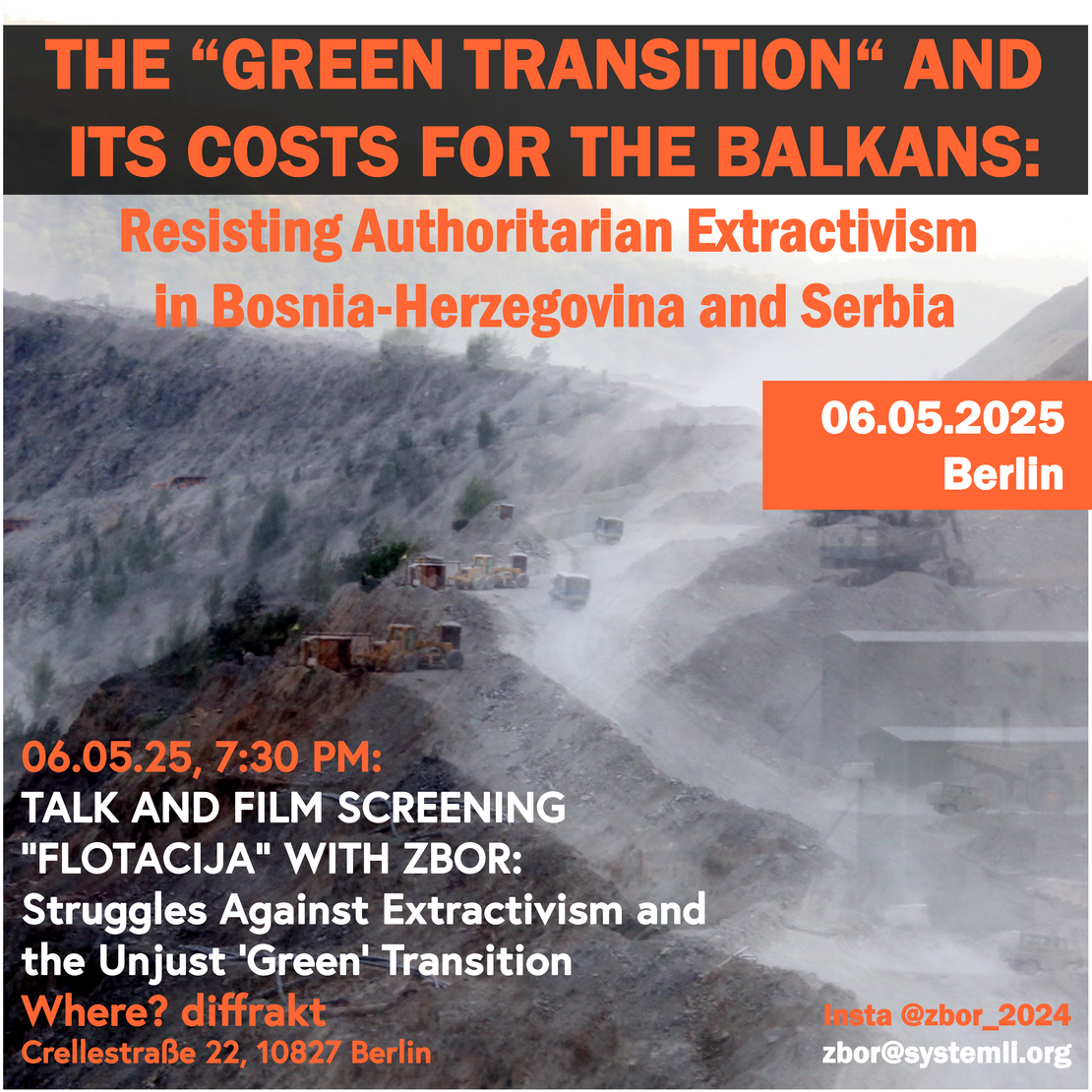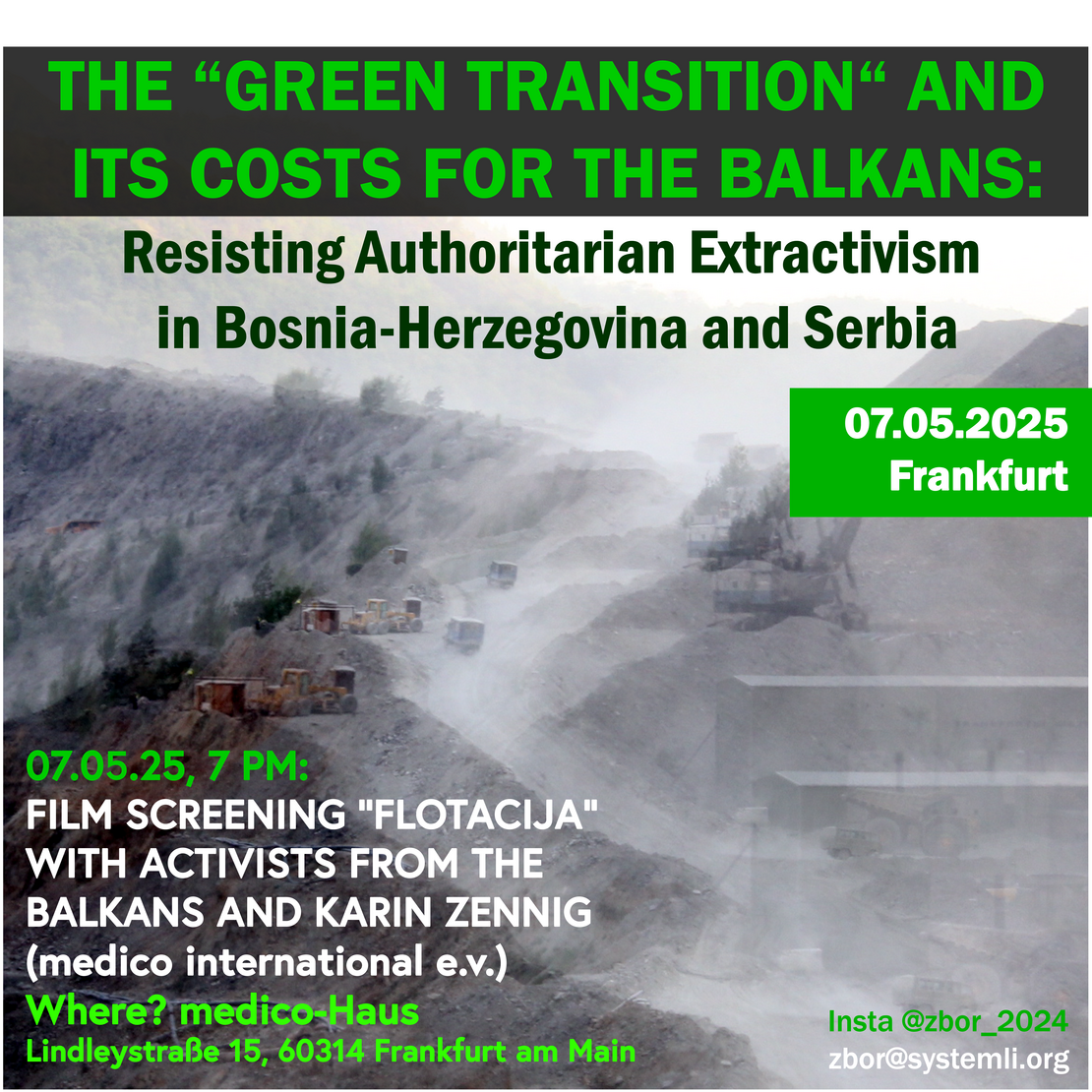May 2025: The "Green Transition and its costs for the Balkans"
Series of events in Kassel (04. & 05.05.), Berlin (06.05.), Frankfurt (07.05.)
Mining projects are on the rise in the Balkans, especially in Serbia and Bosnia -Herzegovina (Dzihic 2024). They are advertised as projects for green development of impoverished deindustrialized peripheries of the European Union (Burdeau 2024). However, given the power imbalances between the capitalist European core countries and the post-Yugoslav region and the power imbalances between local political and economic elites on the one hand and workers on the other, the reality of extractivist projects looks different.
New mines bring a relatively small number of unskilled low-paid jobs and rapid massive extraction of minerals which is shipped to the industries abroad, e.g. to electrify the German automobile industry. At the site of extraction, these projects are threatening long-term subsistence for communities and endangering vital resources, such as water and forests, for populations much bigger than the immediately surrounding villages and towns.
With the EU is “greening” and modernising its capitalism and looking for the required resources nearby, it seems that it is the Balkans that are required to bear the brunt without getting much in return (Kraske 2024). However, protest movements against authoritarian extractivism in the name of green transition have emerged throughout the Balkans, most visibly in Serbia against lithium mining, but the resistance is broader and it is growing (Djukanović 2024). It is this conflictual and contradictory tension, that we want to engage with in our activities in three locations: Kassel, Berlin and Frankfurt

Im Rahmen der Veranstaltungsreihe über "Grünen Extraktivismus" und Proteste gegen Bergbauprojekte in u.a. Bosnien und Serbien zeigen wir in Kooperation mit ZBOR und der Global Labour University den Film "Flotacija".
Im serbischen Majdanpek wird eine Kultur, die historisch für magische Praktiken und übernatürliche Wesen bekannt ist, von einer immer größer werdenden Kupfermine zerstört. Die Mine ist ein Lebensspender und -nehmer und von zentraler Bedeutung für die regionale Wirtschaft, stellt jedoch eine große Bedrohung für die traditionellen Bräuche der lokalen Vlach-Bevölkerung dar, einer ethnischen Minderheit auf dem Balkan, die oft stigmatisiert und übersehen wird. Die Verschmutzung ist so schwerwiegend, dass sie sogar die Drachen vertreibt, die angeblich in den Wäldern leben. Von diesen Konflikten zwischen Natur/Tradition und Industrie/Moderne erzählt der Dokumentarfilm anhand des Lebens einer Familie.
Untertitel auf Deutsch und Englisch.
Am Sonntag, 04.Mai um 11 Uhr im Filmladen Kassel.
Eintritt frei

Arnold-Bode 8 / Raum 0113/0114, Campus Holländischer Platz
The language of discussion will be English/Die Diskussion wird auf Englisch stattfinden.
Mining projects are on the rise in the Balkans, especially in Serbia and Bosnia-Herzegovina. They are advertised as projects for green development of impoverished deindustrialized peripheries of the European Union. However, given the power imbalances between the capitalist European core countries and the post-Yugoslav region and the power imbalances between local political and economic elites on the one hand and workers on the other, the reality of extractivist projects looks different. Only a small share of the produced wealth remains in the region, whereas forests, water and agricultural soil are damaged. Throughout the Balkans, protest movements against authoritarian extractivism in the name of green transition have emerged, most visibly in Serbia against lithium mining, but the resistance is broader and it is growing. It is this conflictual and contradictory tension, that we want to engage with in our panel discussion.
Moderation: Aleksandra Draganic (Global Labour University)
Panel discussants: Activists from Serbia and Bosnia-Herzegovina, Carla Noever Castelos, (Universität Kassel), Edlira Xhafa (GLU Online Academy) and others (tba)

diffrakt | center for theoretical periphery, Crellestraße 22, 10827 Berlin
The lithium deposits in Serbia are supposed to help the ‘green’ transition get off the ground in the EU, and at least since Olaf Scholz’s visit to Belgrade last fall, this has become a big topic in Germany. The ZBOR initiative from the Balkans explicitly opposes the unjust ‘green’ transition and related mining initiatives, because – if implemented – it will cause great environmental damage, have serious social consequences and contribute to turning the Balkans into a mining colony.
The struggles against socially and ecologically devastating mining are particularly intense outside the centers of the capital, such as in Majdanpek, a geographically isolated town inhabited by a marginalized group. There, Eluned Zoë Aiano and Alesandra Tatić shot the documentary “Flotacija” (2023, 77 min.), which seeks and finds intimate connections with the inhabitants and thus accompanies the struggles from an insider’s perspective. The ZBOR initiative, to which the directors belong, will be in Berlin on May 6 to screen the film, discuss it and network with people on the ground.
ZBOR is a word with many layers of meaning for people in the countries of former Yugoslavia. First of all, it means assembly or gathering, and that is how it is known in the villages of the region. However, the Initiative for Climate Justice and Just Transition ZBOR (Združeni Balkanski Otpor i Rad) specifically recalls the meaning(s) from the days of the anti-fascist revolutionary liberation movement of Yugoslavia and its self-organizing mechanisms, as well as from the socialist years, when ZBOR was the basic institution of direct democracy and self-management. ZBOR was a living, everyday democratic practice in every factory, organization, apartment block, school and workplace. ZBOR is a place and time where anything can happen. Today, the word is often reduced to the meaning of ‘chorus,’ but the ZBOR initiative also embraces this contemporary use – because one of its main goals is to gather the voices of the many for our shared world and time.
Info about the documentary: https://www.imdb.com/title/tt27720951/plotsummary/
Trailer: https://vimeo.com/417110626
Background text about the documentary: https://berlinergazette.de/resistance-to-mining-the-possibilityof-dragons-in-an-urban-war-zone-of-capital/
This event is a cooperation between
Ambasada, BG | berlinergazette.de, diffrakt, and Harun Farocki Institut.

medico-Haus, Lindleystr. 15, 60314 Frankfurt
The language of discussion will be English/Die Diskussion wird auf Englisch stattfinden.
Mining projects are on the rise in the Balkans, especially in Serbia and Bosnia-Herzegovina. They are advertised as projects for green development of impoverished deindustrialized peripheries of the European Union. However, given the power imbalances between the capitalist European core countries and the post-Yugoslav region and the power imbalances between local political and economic elites on the one hand and workers on the other, the reality of extractivist projects looks different. Only a small share of the produced wealth remains in the region, whereas forests, water and agricultural soil are damaged. Throughout the Balkans, protest movements against authoritarian extractivism in the name of green transition have emerged, most visibly in Serbia against lithium mining, but the resistance is broader and it is growing. It is this conflictual and contradictory tension, that we want to engage with in our panel discussion.
Panel discussants: Activists from the ZBOR Initiative Serbia and Bosnia-Herzegovina, Karin Zennig (medico international e.V.)
Moderation: Christin Stühlen (Peace Research Institute Frankfurt)
